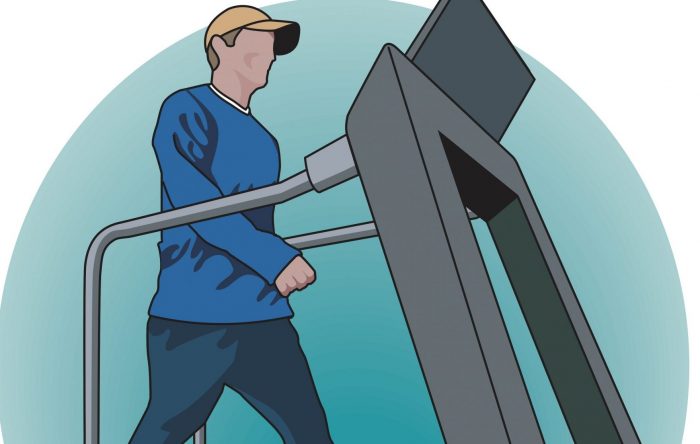Dietary changes can have a dramatic effect
By David Dunaief, M.D.

When we say we “have hemorrhoids,” what we really mean is that our hemorrhoids are irritating and painful. Hemorrhoids are vascular structures that help control our stool, and they can become inflamed.
This type of hemorrhoid pain is very common. Both men and women experience it, although women have a higher propensity during pregnancy and childbirth.
When our hemorrhoids are irritated, we may experience itchy and painful symptoms, making it hard to concentrate and uncomfortable to sit. This is because the veins in your rectum are swollen. They can also bleed, especially during a bowel movement, which can be scary. Fortunately, they don’t portend more serious diseases.
There are two types of hemorrhoids: external, occurring outside the anus; and internal, occurring within the rectum.
Treating external hemorrhoids
Fortunately, external hemorrhoids tend to be mild and can be treated with over-the-counter options. These analgesic creams or suppositories contain hydrocortisone. Another treatment option is a sitz bath.
For a more complete solution, the most effective way to reduce hemorrhoid bleeding and pain is to increase your fiber intake (1).
If you have rectal bleeding and either have a high risk for colorectal cancer or are over the age of 50, you should consult your physician to confirm it is not due to a malignancy or other cause, such as inflammatory bowel disease.
Treating internal hemorrhoids
Internal hemorrhoids are a bit more complicated. The primary symptom is bleeding with bowel movement. Because the hemorrhoids are usually above the point of sensation in the colon, called the dentate line, there is rarely pain. If there is pain and discomfort, it’s often because the internal hemorrhoids have prolapsed, or fallen out of place, due to weakening of the muscles and ligaments in the colon. This allows them to fall below the dentate line.
The first step for treating internal hemorrhoids is the same as for external hemorrhoids: add fiber through diet and supplementation. Study after study shows significant benefit. For instance, in a meta-analysis, fiber reduced the occurrence of bleeding by 53 percent (2). In another study, after two weeks of fiber and another two-week follow-up, daily incidence of bleeding decreased dramatically (3).
What are the treatments for persistent hemorrhoid pain?
There are several minimally invasive options to address persistent and painful hemorrhoids, including banding, sclerotherapy and coagulation. The most effective of these is banding, with an approximate 80 percent success rate (4). This is usually an office-based procedure where rubber bands are placed at the neck of each hemorrhoid to cut off the blood flow. To avoid complications from constipation, patients should also take fiber supplementation.
Side-effects of the procedure are usually mild, and there is very low risk of infection. However, severe pain may occur if misapplication occurs with the band below the dentate line. If this procedure fails, hemorrhoidectomy (surgery) would be the next option.
What can help prevent hemorrhoid problems?
Sitting on the toilet for a long time puts a lot of pressure on the veins in the rectum, which can increase your risk of inflammation. As soon as you have finished moving your bowels, it is important to get off the toilet.
Soften the stool and prevent constipation by drinking plenty of fluids. Exercise also helps. You should not hold in a bowel movement; go when you have the urge to keep the stool from becoming hard, which can lead to straining and more time on the toilet.
Consuming more fiber helps create bulk for your bowel movements, reducing constipation, diarrhea and undue straining.
How much fiber should I consume?
Americans, on average, consume about 16g per day of fiber (5). This is well below the U.S.D.A.’s recommendation: 14 grams of fiber for every 1,000 calories we consume (6). The difference between guidelines and actual consumption has prompted the medical community to express concern about the “fiber gap.”
Fiber underconsumption has greater implications than just hemorrhoids. It contributes to weight control issues, increased insulin sensitivity and chronic inflammation, among others (7). Fiber’s benefits are so great that I recommend many patients target 40 grams a day.
You may want to increase your fiber consumption gradually to minimize the potential for gas and bloating during the first week or two. It will take your system a bit of time to adjust.
I typically recommend making diet adjustments before trying supplementation. Fruits, vegetables, whole grains, nuts, beans and legumes all have significant amounts of fiber. Grains, beans and nuts have among the highest levels. For instance, one cup of black beans contains 12g of fiber.
References:
(1) Dis Colon Rectum. Jul-Aug 1982;25(5):454-6. (2) Cochrane.org. (3) Hepatogastroenterology 1996;43(12):1504-7. (4) Dis Colon Rectum 2004 Aug;47(8):1364-70. (5) usda.gov. (6) Am J Lifestyle Med. 2017 Jan-Feb; 11(1): 80–85. (7) Nutrients. 2020 Oct; 12(10): 3209.
Dr. David Dunaief is a speaker, author and local lifestyle medicine physician focusing on the integration of medicine, nutrition, fitness and stress management. For further information, visit www.medicalcompassmd.com or consult your personal physician.








